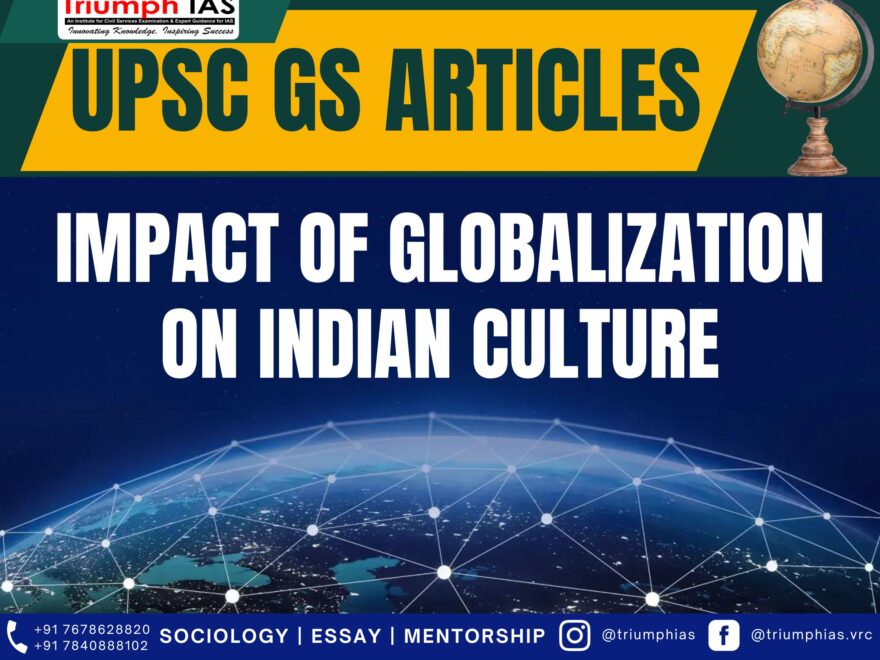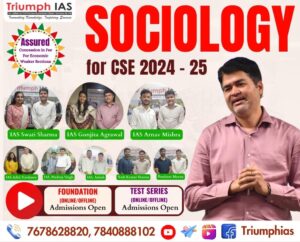IMPACT OF GLOBALIZATION ON INDIAN CULTURE
RELEVANT FOR UPS-CSE GENERAL STUDIES PAPER 1 (IMPACT OF GLOBALIZATION OF INDIAN SOCIETY)

GLOBALIZATION ON INDIAN CULTURE
Globalization is a process of increasing interdependence, interconnectedness and integration of economies and societies to such an extent that an event in one part of the globe affects people in other parts of world.
The effect of globalization is far reaching. It affects us all but affects us differently. Thus, while for some it may mean new opportunities, for others the loss of livelihood. Women silk spinners and twisters of Bihar lost their jobs once the Chinese and Korean silk yarn entered the market. Weavers and consumers prefer this yarn as it is somewhat cheaper and has a shine.
Similar displacements have come with the entry of large fishing vessels into Indian waters. These vessels take away the fish that used to be earlier collected by Indian fishing vessels. The livelihood of women fish sorters, dryers, vendors and net makers thereby get affected. In Gujarat, women gum collectors, who were picking from the ‘julifera’ (Baval trees), lost their employment due to the import of cheaper gum from Sudan. In almost all cities of India, the rag pickers lost some of their employment due to import of waste paper from developed countries.
It is obvious that globalization is of great social significance. But its impact on different sections of society is very different. There are, therefore, sharply divided views about the impact of globalization regarding its effect. Some believe that it is necessary to herald a better world.
Impact of Globalization on Indian Culture
- There are many ways that globalization affects culture. Over the ages India has had an open approach to cultural influences and has been enriched because of this. The last few decades have seen major cultural changes leading to fears that our local cultures would be overtaken. Thus there are heated debates in our society not just about political and economic issues but also about changes in clothes, styles, music, films, languages, body language. The debate is not new and 19th century reformers and early nationalists also debated on culture and tradition. The issues today are in some ways the same, in some ways different. What is perhaps different is the scale and intensity of change.
- A central contention is that all cultures will become similar, that is homogeneous. Others argue that there is an increasing tendency towards globalization of culture. Globalization refers to the mixing of the global with the local. It is not entirely spontaneous. Nor is it entirely delinked from the commercial interests of globalization. It is a strategy often adopted by foreign firms while dealing with local traditions in order to enhance their marketability. In India, we find that all the foreign television channels like Star, MTV, Channel V and Cartoon Network use Indian languages. Even McDonald sells only vegetarian and chicken products in India and not its beef products, which are popular abroad. McDonald’s goes vegetarian during the Navaratri festival. In the field of music, one can see the growth of popularity of ‘Bhangra pop’, ‘Indi pop’, fusion music and even remixes.
- Joint family has been adversely affected due to globalization. There has been an increase in nuclear families. This can be clearly manifested in the increasing number of old age homes that are present now. The diversity in family forms has given way to a dominance of nuclear family in the globalized India
- Due to opening up of food joints like McDonalds, KFC across the country, there has been a homogenization of food available across the country, but there has also been heterogenization in food. Old restaurants are now replaced by Mc. Donalds. Fast food and Chinese dishes have replaced juice corners and Parathas.
- Borrowing of money has become more acceptable now as compared to the past. Taking loans is very common due to increasing access to financial institutions
- In place of old cinema halls, multiplex theatres are coming up.
- Use of English has increased manifold in urban areas, this has led to a homogenization in language across the country, but the rural areas have been less affected by it.
Globalization of Culture
- India has its unique cuisine, but the cuisines of foreign countries have become more easily available, they are modified to suit the taste buds of Indians (like Paneer Tikka Burger in McDonalds). This has led to a wide variety of food being available, leading to heterogenization French, German and Spanish are taught to students right from school level along with indigenous languages, this is an exemplification of hybridization of culture
- Popularity of foreign movies has increased, Hollywood, Chinese, French and Korean movies are quite popular among the urban youth. Along with this, dubbing of these foreign movies in local languages is testimony of increased glocalization.
Festivals: celebrations of Valentines’ day, Friendship day are examples of change in cultural values related to festival. However, along with these new days, traditional festivals are celebrated with equal enthusiasm. - Importance of marriage is decreasing, there has been an increase in divorce, increase in live-in relationships, and single parenting is increasing. Marriage used to be considered as bonding of the souls; but today marriage is becoming professional and contractual. However, despite change in forms of marriage, it has not declined as an institution.
Revival of Culture
- Revival of Yoga in the country as well as in the international level. This can be seen in the popularity of the ‘Art of Living’ course by Ravi Shankar, or the celebration of International Yoga day across the world
- There has been a revival of ayurvedic medicines in the country as well as outside it.
- Due to increasing uncertainty by inter-linkage with the outside world, there has been religious revivalism. This can be manifested in the use of religion to attract voters, or mobilizing people on the basis of religion.
- Increasing demand for local handicraft products in global market, such as Chikenkari or bandhani.
- Due to increasing global tourism, locals are making efforts to preserve their diversity and revive their traditions.
All these changes have led to drastic changes to Indian culture, though most of these changes are confined to the urban areas, but the rural areas are fast catching up. We can see that the western culture is influencing the Indian culture, but it is not replacing it, rather there is a mixture of both cultures. It is to be noted that culture cannot be seen as an unchanging fixed entity that can either collapse or remain the same when faced with social change. What is more likely even today is that globalization will lead to the creation of not just new local traditions but global ones too.

To master these intricacies and fare well in the Sociology Optional Syllabus, aspiring sociologists might benefit from guidance by the Best Sociology Optional Teacher and participation in the Best Sociology Optional Coaching. These avenues provide comprehensive assistance, ensuring a solid understanding of sociology’s diverse methodologies and techniques.
META TAGS:
Impact of Globalization, Indian Culture, Social Significance, Globalization of Culture, Revival of Culture, Nuclear Families, Revival, Social Structures, Chikenkari or bandhani
Why Vikash Ranjan’s Classes for Sociology?
Proper guidance and assistance are required to learn the skill of interlinking current happenings with the conventional topics. VIKASH RANJAN SIR at TRIUMPH IAS guides students according to the Recent Trends of UPSC, making him the Best Sociology Teacher for Sociology Optional UPSC.
At Triumph IAS, the Best Sociology Optional Coaching platform, we not only provide the best study material and applied classes for Sociology for IAS but also conduct regular assignments and class tests to assess candidates’ writing skills and understanding of the subject.
Choose The Best Sociology Optional Teacher for IAS Preparation?
At the beginning of the journey for Civil Services Examination preparation, many students face a pivotal decision – selecting their optional subject. Questions such as “which optional subject is the best?” and “which optional subject is the most scoring?” frequently come to mind. Choosing the right optional subject, like choosing the best sociology optional teacher, is a subjective yet vital step that requires a thoughtful decision based on facts. A misstep in this crucial decision can indeed prove disastrous.
Ever since the exam pattern was revamped in 2013, the UPSC has eliminated the need for a second optional subject. Now, candidates have to choose only one optional subject for the UPSC Mains, which has two papers of 250 marks each. One of the compelling choices for many has been the sociology optional. However, it’s strongly advised to decide on your optional subject for mains well ahead of time to get sufficient time to complete the syllabus. After all, most students score similarly in General Studies Papers; it’s the score in the optional subject & essay that contributes significantly to the final selection.
“A sound strategy does not rely solely on the popular
Opinion of toppers or famous YouTubers cum teachers.”
It requires understanding one’s ability, interest, and the relevance of the subject, not just for the exam but also for life in general. Hence, when selecting the best sociology teacher, one must consider the usefulness of sociology optional coaching in General Studies, Essay, and Personality Test.
The choice of the optional subject should be based on objective criteria, such as the nature, scope, and size of the syllabus, uniformity and stability in the question pattern, relevance of the syllabic content in daily life in society, and the availability of study material and guidance. For example, choosing the best sociology optional coaching can ensure access to top-quality study materials and experienced teachers. Always remember, the approach of the UPSC optional subject differs from your academic studies of subjects. Therefore, before settling for sociology optional, you need to analyze the syllabus, previous years’ pattern, subject requirements (be it ideal, visionary, numerical, conceptual theoretical), and your comfort level with the subject.
This decision marks a critical point in your UPSC – CSE journey, potentially determining your success in a career in IAS/Civil Services. Therefore, it’s crucial to choose wisely, whether it’s the optional subject or the best sociology optional teacher. Always base your decision on accurate facts, and never let your emotional biases guide your choices. After all, the search for the best sociology optional coaching is about finding the perfect fit for your unique academic needs and aspirations.
Follow us :



Find More Blogs
| Compare and contrast Karl Marx’s and Max weber’s | Karl Marx- Historical Materialism |
| Position of Women In the Modern Indian Society | Sociology: Social system and pattern variables |





Hey there! Your essay was rather eye-opening, but I couldn’t help but notice that you, in your admirable attempt to convey the widespread effects of globalisation in our country, may have conveyed what can be best described as unsubstantiated hearsay and anecdotal evidence as proof of your claims. I would love to see some data regarding the various points you’ve gone over in your essay. Cheers.